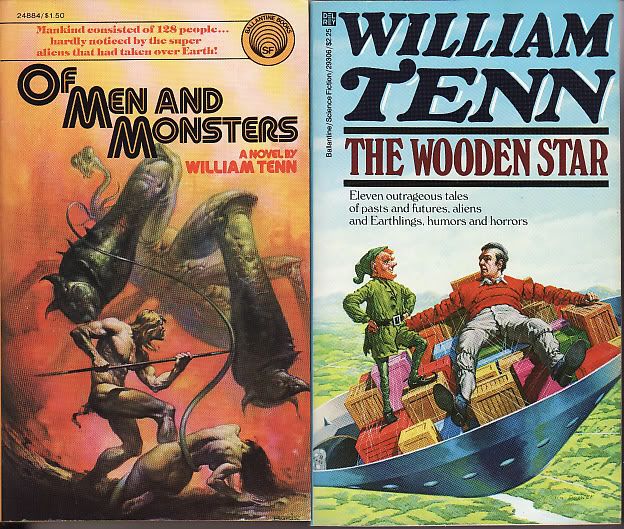Omphalos
הדרךקפיצת
- Joined
- Oct 24, 2007
- Messages
- 777
I got this off the SFRA list-serv:
*William Tenn, Science Fiction Author, Is Dead at 89 *
By GERALD JONAS
Published: February 13, 2010. New York Times, Feb. 14, 2010, page A24 of the
New York edition.
William Tenn, who wrote satirical science fiction at a time when few writers
in the genre displayed a sense of humor, died at his home in Pittsburgh on
Feb. 7. He was 89.
His death was announced by his niece the pediatrician Perri Klass, a
contributor to The New York Times.
Mr. Klass, whose real name was Philip Klass, brought biting wit, restless
intelligence and a supple prose style to classic science-fiction themes like
time travel and alien-human interactions. A contemporary of Robert A.
Heinlein, Isaac Asimov and Arthur C.
Clarke<Arthur C. Clarke News - The New York Times>,
he helped create modern science fiction in the 1940s and ’50s, when the
genre’s dominant form was the short story, published in monthly magazines
known as pulps, for the poor quality of their paper.
As a Swiftian humorist in a field better known for futuristic speculation,
rousing space adventures and grim cautionary tales, he was admired but never
quite embraced by his contemporaries. He was repeatedly passed over for the
major awards granted by the genre’s fans and writers — an omission somewhat
amended when he was named guest of honor at the 2004 World Science Fiction
Convention, nearly four decades after he had all but abandoned writing
fiction to teach at Pennsylvania State
University<Pennsylvania State University News - The New York Times>
.
Philip Klass was born in London on May 9, 1920, and immigrated with his
parents to New York as a baby. Raised in Brooklyn, he served in the Army
during World War II as a combat engineer; after his discharge he began
selling stories to magazines like Astounding Science Fiction. Pen names were
common among magazine writers of the time; Mr. Tenn later said he could not
remember why he chose William Tenn for his science fiction, but once he had
gained a reputation under that name, editors would not let him publish under
his own.
Perhaps his quintessential short story is “Brooklyn Project” (1948), which
in under 10 pages describes a top-secret government experiment in time
travel that goes eerily awry. He wrote it as a political satire, aimed at
anti-Communist witch hunts like those of the House Un-American Activities
Committee. Its depiction of a docile press corps bullied into submission by
the government might have been written in the first decade of the 21st
century. But its real target is the age-old human failing of hubris.
In the plot, a government spokesman repeatedly assures reporters that travel
into the past cannot possibly have any effect on the present — even as the
spokesman and all the reporters morph into “slime-washed” and “bloated
purpled bodies” that have evolved along the new timeline created by the
experiment. Mr. Tenn gives the self-satisfied spokesman the last word.
“ ‘See,’ cried the thing that had been the acting secretary to the executive
assistant on press relations,” the story concludes. “He extended 15 purple
blobs triumphantly: ‘Nothing has changed!’ ”
Mr. Tenn had a lifelong lover’s quarrel with science fiction. In a 1975
interview, he described it as a “peculiarly modern” form of literature,
“fundamentally derived from the industrial and scientific revolutions.” But
he deplored “the idiocies and the bad writing in it, the cliquishness, the
cultishness,” which he said “don’t really belong in an adult form.”
His disaffection with the field led him to accept a one-year appointment to
teach at Penn State in 1966, despite having no college degree. He remained
on the faculty for 23 years, offering popular courses in writing and on
science fiction as literature.
Beginning in 2001, Nesfa Press, the publishing arm of the New England
Science Fiction Association, reprinted his complete works in three volumes.
His stories have been translated into French, German, Russian, Japanese and
other languages.
He is survived by his wife, Fruma Klass, a writer whom he married in 1957; a
daughter, Adina Klass Lamana; and a sister, Frances Goldman-Levy.
He wrote little fiction after becoming a teacher, a major exception being
“On Venus, Have We Got a Rabbi,” published in 1974 in a Jewish-themed
anthology called “Wandering Stars,” which tackles the question of whether a
Hebrew-speaking alien that looks like a “wrinkled and twisted” brown pillow
with short gray tentacles can be considered a Jew.
As for his own identity, he declared in an interview in 1975: “I’m a mystic.
A very rational Jewish orthodox
atheist<Atheism News - The New York Times>mystic.”
*William Tenn, Science Fiction Author, Is Dead at 89 *
By GERALD JONAS
Published: February 13, 2010. New York Times, Feb. 14, 2010, page A24 of the
New York edition.
William Tenn, who wrote satirical science fiction at a time when few writers
in the genre displayed a sense of humor, died at his home in Pittsburgh on
Feb. 7. He was 89.
His death was announced by his niece the pediatrician Perri Klass, a
contributor to The New York Times.
Mr. Klass, whose real name was Philip Klass, brought biting wit, restless
intelligence and a supple prose style to classic science-fiction themes like
time travel and alien-human interactions. A contemporary of Robert A.
Heinlein, Isaac Asimov and Arthur C.
Clarke<Arthur C. Clarke News - The New York Times>,
he helped create modern science fiction in the 1940s and ’50s, when the
genre’s dominant form was the short story, published in monthly magazines
known as pulps, for the poor quality of their paper.
As a Swiftian humorist in a field better known for futuristic speculation,
rousing space adventures and grim cautionary tales, he was admired but never
quite embraced by his contemporaries. He was repeatedly passed over for the
major awards granted by the genre’s fans and writers — an omission somewhat
amended when he was named guest of honor at the 2004 World Science Fiction
Convention, nearly four decades after he had all but abandoned writing
fiction to teach at Pennsylvania State
University<Pennsylvania State University News - The New York Times>
.
Philip Klass was born in London on May 9, 1920, and immigrated with his
parents to New York as a baby. Raised in Brooklyn, he served in the Army
during World War II as a combat engineer; after his discharge he began
selling stories to magazines like Astounding Science Fiction. Pen names were
common among magazine writers of the time; Mr. Tenn later said he could not
remember why he chose William Tenn for his science fiction, but once he had
gained a reputation under that name, editors would not let him publish under
his own.
Perhaps his quintessential short story is “Brooklyn Project” (1948), which
in under 10 pages describes a top-secret government experiment in time
travel that goes eerily awry. He wrote it as a political satire, aimed at
anti-Communist witch hunts like those of the House Un-American Activities
Committee. Its depiction of a docile press corps bullied into submission by
the government might have been written in the first decade of the 21st
century. But its real target is the age-old human failing of hubris.
In the plot, a government spokesman repeatedly assures reporters that travel
into the past cannot possibly have any effect on the present — even as the
spokesman and all the reporters morph into “slime-washed” and “bloated
purpled bodies” that have evolved along the new timeline created by the
experiment. Mr. Tenn gives the self-satisfied spokesman the last word.
“ ‘See,’ cried the thing that had been the acting secretary to the executive
assistant on press relations,” the story concludes. “He extended 15 purple
blobs triumphantly: ‘Nothing has changed!’ ”
Mr. Tenn had a lifelong lover’s quarrel with science fiction. In a 1975
interview, he described it as a “peculiarly modern” form of literature,
“fundamentally derived from the industrial and scientific revolutions.” But
he deplored “the idiocies and the bad writing in it, the cliquishness, the
cultishness,” which he said “don’t really belong in an adult form.”
His disaffection with the field led him to accept a one-year appointment to
teach at Penn State in 1966, despite having no college degree. He remained
on the faculty for 23 years, offering popular courses in writing and on
science fiction as literature.
Beginning in 2001, Nesfa Press, the publishing arm of the New England
Science Fiction Association, reprinted his complete works in three volumes.
His stories have been translated into French, German, Russian, Japanese and
other languages.
He is survived by his wife, Fruma Klass, a writer whom he married in 1957; a
daughter, Adina Klass Lamana; and a sister, Frances Goldman-Levy.
He wrote little fiction after becoming a teacher, a major exception being
“On Venus, Have We Got a Rabbi,” published in 1974 in a Jewish-themed
anthology called “Wandering Stars,” which tackles the question of whether a
Hebrew-speaking alien that looks like a “wrinkled and twisted” brown pillow
with short gray tentacles can be considered a Jew.
As for his own identity, he declared in an interview in 1975: “I’m a mystic.
A very rational Jewish orthodox
atheist<Atheism News - The New York Times>mystic.”



